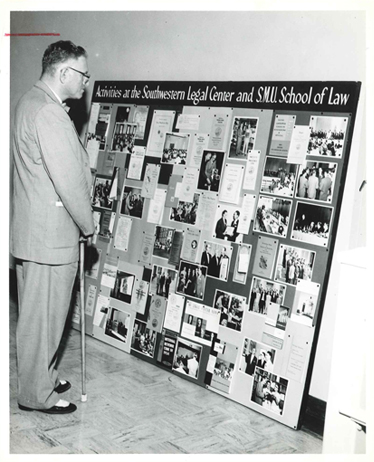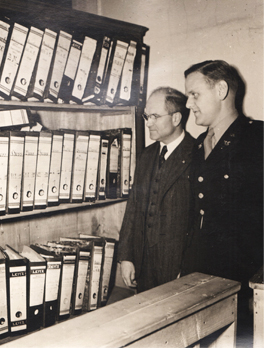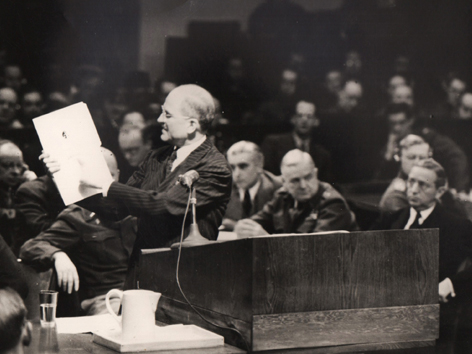© 2016 The Texas Lawbook.
By Kerry Curry
(Oct. 17) – The Nuremberg trials were 70 years ago, but the historical war tribunal continues to provide acute lessons for world leaders today.
Next week, Plano-based Center for American and International Law will host an extraordinary one-hour symposium that highlights the many connections between Dallas and the Nuremberg trials. The Oct. 24 event, which is open to the public, will explore key historical aspects of the trials, the international legal issues they raised and today’s implications.
CAIL plans to unveil rare artifacts collected by CAIL founder and former SMU Dedman School of Law Dean Robert G. Storey during his time as executive trial counsel to U.S. Supreme Court Justice Robert H. Jackson in the prosecution of high-ranking Nazi officials at the Nuremberg trials.
The historic documents and artifacts on display include Adolf Hitler’s “Private Will and Political Testament,” “Field Orders to Invade USSR,” “Secret Strategy Memo” and death records from the Mauthausen Concentration Camp.

“Part of [Storey’s] job was collecting evidence and he went around to old German castles and found the evidence and presented it at the Nuremberg trials,” said Harry Storey, a grandson who will attend the event with his mother, Helen, his son, William, and other relatives.
Robert Storey served in the Army Air Corps Intelligence during most of World War II. When he was asked to go to Germany to assist with the Nuremberg trials as executive trial counsel, Storey resigned his military commission, Harry Storey said. After the trials, Storey received the U.S. Medal of Honor and the French Legion of Honor.
“His feeling was he did not want it to appear that the military was just seeking retribution but that it was a matter of trying to do justice for all mankind,” Harry Storey said. “He wanted it to be a civil action by all of the Allied countries.”
After Nuremberg, Storey became dean of SMU’s law school from 1947 to 1959 and founder of what is now known as CAIL. He also served on a civil rights commission under President Eisenhower, a role he continued under President Kennedy. He served the Johnson Administration on the President’s Commission on Law Enforcement and Administration of Justice. Storey died in 1981 at the age of 87.
Mike Marchand, president of CAIL and a former chief appellate judge in the U.S. Army, said Storey’s experiences in WWII and during the Nuremberg trials convinced him of the importance of international law, which led Storey to found the Southwestern Legal Foundation, the precursor to CAIL, to educate lawyers on international law.
The foundation expanded in the late 1950s to include a domestic piece — the training of law enforcement officers on community policing, servant leadership, transparency and de-escalation.
The Storey and Seay Nuremberg collections
“Thanks to the generosity of the Storey family, we (CAIL) have a number of historical pieces from the tribunals and World War II that help tell the story of the Nuremberg Trials,” Marchand said.
 CAIL wanted to display the items and decided the 70th anniversary of the tribunal was a good opportunity to highlight the display and provide a program.
CAIL wanted to display the items and decided the 70th anniversary of the tribunal was a good opportunity to highlight the display and provide a program.
Also available for viewing at the event will be some personal items that belonged to George E. Seay, a Dallas resident and attorney who also served as a prosecutor during the trials. Like Storey, Seay served in the Army Air Corps and was stationed at the Pentagon prior to Nuremberg.
After Nuremberg, Seay became a well-known attorney with his own firm in Dallas and in his later years joined Haynes and Boone. His grandson, George E. Seay III, a licensed attorney, is chairman of money management firm Annandale Capital in Dallas.
The Seay collection includes photos and newspaper articles from the time period, including a letter he wrote to his mother.
Reflecting on Nuremberg’s significance
The event will feature three speakers:
• John Barrett, professor of law at St. John’s University in New York who is writing a book about Robert H. Jackson, the late U.S. Supreme Court justice and chief prosecutor at Nuremberg;
• David Crane, executive director of the Lender Center for Social Justice and Atrocity Prevention at Syracuse University and the former chief prosecutor of the Special Court for Sierra Leone; and
• Leila Nadya Sadat, a human rights expert and professor of International Criminal Law at Washington University School of Law. In 2012, Sadat was appointed as a special adviser on crimes against humanity to the International Criminal Court.
The speakers will address Nuremberg’s historical significance, the legal implications and the impact of Nuremberg on today’s society.
Susan Karamanian, formerly an attorney at what is now Locke Lord in Dallas and currently an associate dean at George Washington University Law School, said CAIL wants to reflect on Nuremberg because there is an increased emphasis in the world today on how the law can be used to establish accountability. Karamanian is a member of CAIL’s board of trustees.

“The Nuremberg trials enabled the public to learn of the atrocities that occurred at the behest of the Nazis … the details of the concentration camps, work camps, plans to destroy the Jewish people,” she said, noting that Nuremberg created historical evidence of the atrocities. “In certain instances, we’ve had exterminations of people, yet a lot of that evidence has not been gathered, presented and preserved.”
Besides establishing and preserving the record, Nuremberg shone a light on the need to have an international tribunal to hold people to justice, she said. A number of international tribunals have been held since Nuremberg, including tribunals in the former Yugoslavia and Rwanda, among others.
“The work of Nuremberg helped shaped to a certain extent the establishment of these other tribunals,” she said.
While members of the Dallas legal community who knew Robert Storey or George Seay know of the city’s connection to Nuremberg, newer residents and non-lawyers may not, said Harriet Miers, chairman of CAIL’s board of trustees.
“One aspect of this program will be to remind people of that connection and the important roles that Robert Storey and George Seay played in Nuremberg,” Miers said.
Raising CAIL’s profile in Dallas
CAIL has an international following that many locals may not know about. Lawyers from around the world have come to the center for educational training.
“This international reach distinguishes us from almost every organization like us,” said David Winn, vice president of CAIL and director of CAIL’s Institute for Transnational Arbitration. “We provide top quality education not just to lawyers but law enforcement officials.” The center has hosted participants from 130 countries over the years.
The Texas Lawbook is a media sponsor of the event. See a list of other sponsors on the CAIL website.
© 2016 The Texas Lawbook. Content of The Texas Lawbook is controlled and protected by specific licensing agreements with our subscribers and under federal copyright laws. Any distribution of this content without the consent of The Texas Lawbook is prohibited.
If you see any inaccuracy in any article in The Texas Lawbook, please contact us. Our goal is content that is 100% true and accurate. Thank you.
